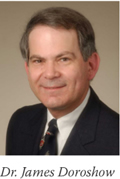
Reactivating Tumor Suppressor Genes
Name of the Trial
Phase I Study of 5-Fluoro-2'-Deoxycytidine and Tetrahydrouridine in Patients with Advanced Solid Tumors (NCI-06-C-0221). See the protocol summary at http://cancer.gov/clinicaltrials/NCI-06-C-0221.
 Principal Investigator Principal Investigator
Dr. James Doroshow, NCI CCR and DCTD
Why This Trial Is Important
A drug called 5-fluoro-2'-deoxycytidine (FdCyd) may be effective in blocking a cellular process called DNA methylation, which is believed to play an important role in the development of many cancers. Excessive methylation (hypermethylation) may silence, or "turn off," genes that suppress tumor formation, thereby allowing abnormal cells to proliferate.
Preclinical studies have shown, however, that FdCyd is rapidly broken down in the body, and the breakdown products do not block methylation. Another drug called tetrahydrouridine (THU) may help prevent FdCyd breakdown when administered with it. THU may allow FdCyd to remain intact long enough to reduce the hypermethylation of tumor suppressor genes and possibly allow them to be reactivated.
This is the first clinical trial to test the combination of FdCyd and THU in humans. Researchers are interested in establishing the maximum tolerated dose and determining how this regimen affects the methylation of certain genes. They will also determine the toxicity of this treatment, and examine its effects on levels of proteins that are important for the progression of cancer.
"FdCyd/THU is being developed collaboratively by researchers at the City of Hope Comprehensive Cancer Center and the NCI," said Dr. Doroshow. "So far, patients in the trial have tolerated the combination well, and we have seen some clinical responses.
"Our hope is to develop the regimen as an orally available combination that will safely and effectively deliver repetitive doses of these tumor-suppressor gene-activating agents to patients."
Who Can Join This Trial
Researchers will enroll up to 60 adult patients with advanced solid tumors that have not responded to standard treatment. See the list of eligibility criteria at http://cancer.gov/clinicaltrials/NCI-06-C-0221.
Study Sites and Contact Information
This study is taking place at the NIH Clinical Center in Bethesda, MD, and at study sites in California. See the list of study contacts at http://cancer.gov/clinicaltrials/NCI-06-C-0221 or call the NCI Clinical Trials Referral Office at 1-888-NCI-1937. The toll-free call is confidential.
An archive of "Featured Clinical Trial" columns is available at http://cancer.gov/clinicaltrials/ft-all-featured-trials. |